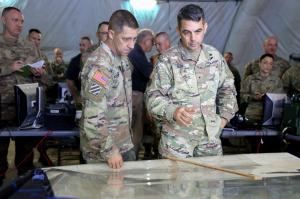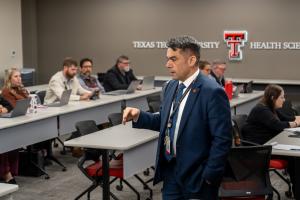Mission First – Leading Soldiers and Health Care Professionals
Celebrating Veterans: General Martin Clay’s Legacy of Service and Leadership
In the military, we’re not just responsible for our work — we’re responsible for our soldiers’
families too. That sense of family is something I carry with me in all aspects of my life.”
LUBBOCK, TX, UNITED STATES, November 10, 2025 /EINPresswire.com/ -- From his initial enlistment in the Army National Guard 36 years ago to his leadership in military and civilian health care management roles, Major General Martin Clay’s career has been shaped by adaptability, mission focus and service to others.— Major General Martin Clay
General Clay joined the Army National Guard through an ROTC scholarship while attending the University of Missouri. The decision was practical: It provided a way to pay for his education.
“I joined for the college money, and I stayed because I enjoyed the people and the concept of the service,” he said. “I quickly found that the military offered much more than I expected. It was an experience that shaped me and set me on a more service-oriented path than I had been on before.”
Early on, General Clay’s experience in the Guard helped him develop leadership skills through mentoring and training soldiers, a role he came to value.
He said, “I enjoyed being in a position to help, coach and teach people. I enjoyed the idea of helping soldiers become better. I enjoyed the idea of being a servant and helping people.”
His military service has been diverse. General Clay has responded to local and state emergencies, including major floods in 1993 and 2011. His deployment history includes major assignments, such as supporting Operation Noble Eagle and Operation Spartan Shield, Kosovo peacekeeping operations and the 2022 evacuation and relocation of Afghan allies following the U.S. withdrawal from Afghanistan.
“Every assignment is an opportunity to learn something new,” he said.
In August, Clay was promoted to Major General at a ceremony at the Jefferson Barracks Military
Post near St. Louis, Missouri, where he started his military career in 1989. In September, he
assumed leadership of the 35th Infantry Division of the National Guard, overseeing
approximately 14,000 soldiers across eight brigades in six states.
“I’ve changed and grown,” he said. “Leadership styles evolve as you take on more responsibility.
I think my personality has remained the same. I’ve always prioritized being available to the
people that I work with, whether it’s in the military or in the civilian world.”
Adaptability has been critical in both his military and civilian careers. General Clay has more than 20 years of leadership experience in the health care industry. He focused on health care law while earning his J.D. from Saint Louis University in 1999. After graduating, General Clay worked at a law firm with a strong health care practice. He later earned an MBA and transitioned to the business side of health care, eventually becoming the chief financial officer for a major academic medical practice in Missouri.
Since 2023, he has served as the Texas Tech University Health Sciences Center (TTUHSC)
associate vice president for Clinical Practice, TTUHSC School of Medicine executive associate
dean and executive director of Texas Tech Physicians.
“In both the military and civilian sectors, the goal is to lead people effectively and earn and build
trust,” he explained. “In the military, that often means direct authority, but in health care, it’s
more about fostering relationships and working with a team.”
His military mindset of “mission first” applies in his health care role, too.
“There’s something special about the mission here,” he said, pointing to the importance of
providing care to underserved communities. “It’s about serving everyone — not just those who
can afford it, but also those who can't. The mission is to make efficient, effective, high-quality
health care accessible to all.”
It’s a sentiment that echoes his military career, where looking out for the welfare of the team — and their families — is always paramount. That sense of family, community and shared responsibility, he said, is what he believes sets the military apart from civilian workplaces.
“In the military, we’re not just responsible for our work — we’re responsible for our soldiers’
families too. That sense of family is something I carry with me in all aspects of my life.”
His approach to leadership is grounded in making sure those he leads — whether in the military
or in health care — have the resources and support they need to succeed.
“As a leader, my focus is always on the people,” he stated. “Whether I’m managing soldiers or
health care professionals, it’s about ensuring the mission is clear and everyone is well equipped
to do their job.”
-30-
Suzanna Cisneros
Texas Tech University Health Sciences Center
+1 806-773-4242
email us here
Legal Disclaimer:
EIN Presswire provides this news content "as is" without warranty of any kind. We do not accept any responsibility or liability for the accuracy, content, images, videos, licenses, completeness, legality, or reliability of the information contained in this article. If you have any complaints or copyright issues related to this article, kindly contact the author above.


